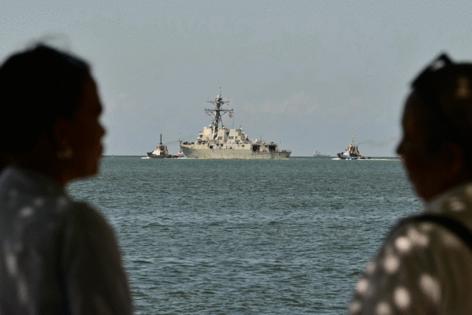Trump threatens Latin America but leaves US strategy unclear
Published in News & Features
WASHINGTON — President Donald Trump suggested he could expand U.S. military strikes in Latin America beyond Venezuela to targets on land in Colombia and even Mexico, spooking markets and raising fresh questions about his strategy for the region.
On Monday, Trump said he’d be “proud” to expand strikes that have targeted alleged drug-running boats in the Caribbean Sea and eastern Pacific to targets on land in Venezuela, Colombia and Mexico over concerns about drugs and immigration. Trump said he may even deploy ground troops to Mexico, saying he’s “not happy” with the country.
The comments — which hit the Mexican peso — echo remarks he’s made in the past about potentially using force to seize Greenland and take back the Panama Canal. In his book, former Defense Secretary Mark Esper said Trump once even mused about launching missiles into Mexico.
In this case, Trump has backed up his threats by moving more naval assets to the Caribbean, including a strike group led by the USS Gerald R. Ford, the world’s largest aircraft carrier.
The military build-up in the region and the aggressive rhetoric from senior Trump administration officials against Venezuelan leader Nicolás Maduro have spurred questions among members of Congress and military experts about what the White House would do next — as well as the overall U.S. endgame in Latin America.
The Ford “isn’t necessary for countering trafficking at sea,” Bryan Clark, a senior fellow at the Hudson Institute, said in an interview. “It would only be good for striking targets ashore.”
Trump has already suggested the U.S. was considering hitting targets in Venezuela itself, sparking concerns in Washington that he could expand the military conflict without congressional authorization. The open-ended campaign of lethal strikes against alleged trafficking vessels has already killed about 80 people, prompting accusations from scholars and some on Capitol Hill that the administration is engaged in extrajudicial killings.
“I can’t imagine a scenario where it wouldn’t have been appropriate with this long build up if you were to take an action not to brief Congress first,” Senator Mark Warner, a Virginia Democrat, said in an interview on Monday. “I think this guy is going to keep pushing the boundaries and barriers everywhere and every place he can.”
Secretary of State Marco Rubio, who also serves as Trump’s national security advisor, has pushed a parallel pressure campaign against Maduro, whom the administration views as an illegitimate “narco-terrorist” with a $50 million bounty on his head.
On Sunday, Rubio announced the U.S. plans to designate a Venezuelan drug cartel it alleges is led by Maduro as a foreign terrorist organization — a move that potentially provides additional justification for wider military action. Also over the weekend, Trump told reporters he had “sort of” decided how to proceed on Venezuela, but was not yet willing to reveal his plans.
On Monday, Trump said he would “probably” be open to speaking directly with Maduro while cautioning he was “not in love with the people running Venezuela.”
“We just have to take care of Venezuela,” Trump said Monday in the Oval Office.
But while Trump is famously erratic with foreign policy pronouncements, his comments about military strikes against two additional countries on Monday muddied the overall U.S. military strategy in the region.
“Colombia has cocaine factories where they make cocaine. Would I knock out those factories? I would be proud to do it, personally,” Trump said. “I didn’t say I’m doing it, but I would be proud to do it.”
He added that he would likely go to Congress for authorization. “The Democrats or the Republicans would both agree, unless they’re crazy, and they are a little crazy on the Democrat side,” Trump said.
After his comments about potential strikes in Mexico on Monday, saying they would be “OK with me,” the Mexican peso dropped to a session low. The Mexican Foreign Ministry didn’t immediately respond to a request for comment.
The remarks marked an abrupt shift from last week, when Rubio said the U.S. was working more closely than ever with Mexico to interdict drugs, and that the administration was not planning “unilateral action” or the deployment of troops. It would not be the first time that Trump’s comments in the Oval Office contradicted Rubio’s diplomatic efforts.
When the U.S. military operations against alleged drug boats first began in September, the focus was primarily on “countering drugs with a side of intimidating Maduro,” according to Mark Cancian, a senior defense adviser with the Center for Strategic and International Studies. “Over time, that aspect has grown.”
All of these capabilities “are great if you want to strike land,” Cancian added. “It doesn’t mean they will.”
_____
With assistance from Eric Martin, Gonzalo Soto, Derek Wallbank and Jordan Fabian.
_____
©2025 Bloomberg L.P. Visit bloomberg.com. Distributed by Tribune Content Agency, LLC.







Comments